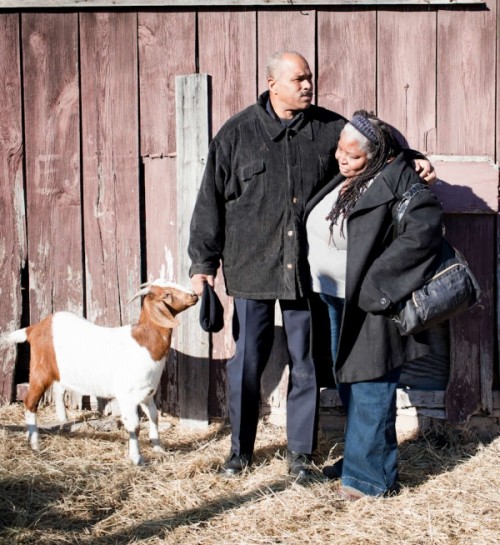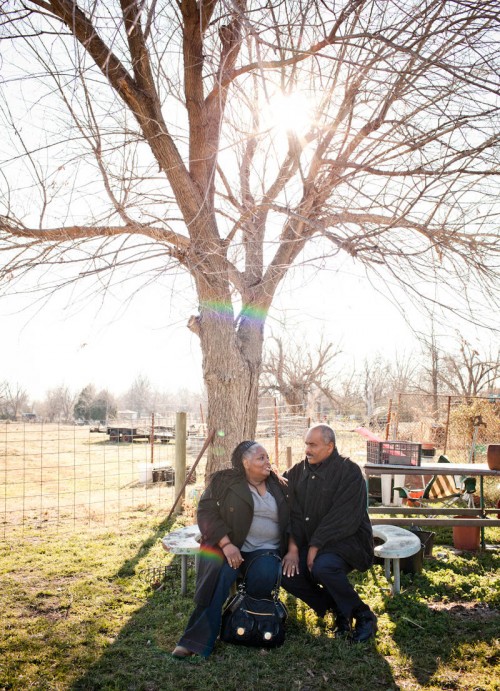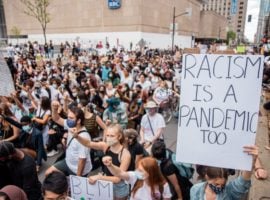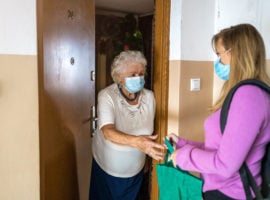This spotlight is a feature in a series of the USDA Community Food Project Competitive Grant Program (CFP). Grantees are doing some of the most innovative and collaborative projects to change local and regional food systems. WhyHunger’s Food Security Learning Center — also funded by a CFP grant — is profiling these organizations through dynamic stories and pictures, to give a real flavor of what the projects look like and how they’re accomplishing their goals. Up today: Ingersoll Gardens and the Myrtle Avenue Revitalization Project in Brooklyn, NY. Story, pictures and video by David Hanson.

Rufus Newsome presses his ear against the cold wooden side of a beehive. His massive hand nearly covers the top of the box as he listens for a barely audible hum. He hears it. The hives are surviving the dead of winter in Oklahoma’s Green Country. They’ll live to pollinate another crop of clover and the orchard of peach, pear, and apple trees at Newsome Community Farms.
As we walk back toward the Newsomes’ farmhouse, a mini-van pulls into the driveway off the roadside. A young woman gets out and waits at the farm gate for Rufus to walk over. She’s run out of gas and has called for someone to bring her a few gallons. Three young children and another young woman wait in the car. Rufus says he’s got some gas in the barn.
“I don’t know why, but cars are always breaking down right here,” Rufus says as we look for the small red gas can in the barn. “I get people knocking on my door all times of day and night.”
Rufus, a Tulsa police officer when he’s not a farmer, thinks it’s because his cop car sits in the driveway. It also could be because Rufus and his wife Demalda have created not only a five-acre farm on the rural outskirts of north Tulsa, but a small community welcome to all.
Demalda and Rufus met in the fourth grade in Greenville, MS. “I remember seeing him and thinking, ‘that boy will be my husband,’” Demalda says.
 They didn’t see each other again until the 10th grade, then they started dating as seniors in high school before attending Mississippi Valley State University. They’ve been together ever since.
They didn’t see each other again until the 10th grade, then they started dating as seniors in high school before attending Mississippi Valley State University. They’ve been together ever since.
In 1995 the couple bought the old farm on the northern skirt of Tulsa city limits. They’d grown up on farms in the Delta, and they hadn’t been too far gone from it to know how to raise their own food and animals. By 1999 they had enough farm going to start a market on the property.
The Newsomes are not the back-to-the-land types who want to disappear behind the farm fence. Rufus works over fifty hours a week on street patrol with the Tulsa police. And Demalda does her own sort of pavement-pounding. She works the predominantly African-American and low-income North Tulsa community, sharing the tenets of food justice and the power that comes with controlling your food.
Demalda and Rufus’ journey into food and community activism and altruism has deep roots in their upbringing in the impoverished Mississippi Delta and in Demalda’s Catholic faith. She believes you pay your rent on this earth by helping others. In their early years in Tulsa, before moving onto the farm, Demalda and Rufus took an apartment in a low-income housing project. They didn’t need to, but to Demalda it was a form of missionary work right there in her community. Why travel around the world when there are needs in your backyard, she thought. They worked within the housing community to teach people healthier ways to live. Eventually, their young son, Chris, grew uncomfortable in the confined space and asked that they leave the projects.
Continue reading on Community Voices.





